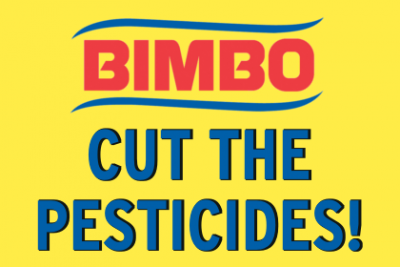On Sunday, September 25, OCA activists joined Greenpeace teams in the U.S. and Mexico to participate in Bimbo’s Global Energy Race. We dressed as bees and crossed the finish lines in Long Beach, Calif., Mexico City and Philadelphia with banners that read: “Bimbo, Cut the Pesticides!”

If we had been protesting a Monsanto or Bayer event, people immediately would have understood the bee costumes. Most people who have paid attention to the news about disappearing bees know that pesticides manufactured by these agro-chemical companies are contributing to bee deaths.
But we were targeting Bimbo, the world’s largest baking company. So spectators and fellow runners wondered what was up with the bee outfits. (Our Mexico City team got a lot more than questions. They were tackled to the ground as they crossed the finish line with their banners. You can watch it here.)
We explained that, agro-chemical companies like Monsanto & Bayer aren’t going to stop making bee-killing pesticides unless food companies like Bimbo stop driving their use. If a company like Bimbo were to clean up its supply chain and stop using ingredients from crops raised with bee-killing pesticides, it would go a long way to addressing colony collapse disorder (not to mention environmental pollution and human health problems).
We think Bimbo is the type of company that might (should) take the lead on something like this. The company is already a leader on the climate change issue. Grupo Bimbo has:
• Taken action to minimize the risk of deforestation through its supply change as a signer of the UN Declaration of Forests and through a global policy of buying sustainable palm oil.
• Improved energy efficiency in its plants’ operations and in its distribution.
• Significantly increased the use of renewable energies by using solar and wind power. Its wind-farm is the largest of any food company.
Now, we want Bimbo to look at another piece of its supply chain that impacts the climate: the way its ingredients are grown. Bimbo should:
• Eliminate the use of the pesticides that are banned in other countries but still used in the U.S. (there are 5) and Mexico (30).
• Reduce overall pesticide and chemical fertilizer use.
• Voluntarily label the foods they sell that contain genetically modified organisms (GMOs) as “produced with genetic engineering.” Bimbo so far has opposed this, spending more than $1 million to block GMO labels in the U.S.
• Promote ecological farming pilot projects in its supply chains.
• Work with other companies and governments for a more ecological food system. A good first step would be signing onto the Soils for Food Security and Climate Initiative (4p1000.org).
Mexico-based Grupo Bimbo is the world’s largest baking company, with operations in 21 countries. Bimbo operates 60 bakeries in the U.S., making it the largest baking company in the U.S., where it markets 29 brands, including Arnolds, Sara Lee, Thomas’ English Muffins, Orowheat, Stroemans. In July (2016), Bimbo bought its first organic brand, Eureka.
Bimbo is huge in Latin America, too, where it’s the Mexican version of Wonder Bread. (In fact, Bimbo bakes Wonder Bread in Mexico, while Flowers Foods is the U.S. manufacturer.)
As we all know, bigger doesn’t always mean better. But the biggest baking company in the world could cause a huge ripple effect through global supply chains if it announced that it would no longer purchase ingredients grown with pesticides. How about it, Bimbo?
In case you missed it, sign our Bimbo petition here.
Enviroshop is maintained by dedicated NetSys Interactive Inc. owners & employees who generously contribute their time to maintenance & editing, web design, custom programming, & website hosting for Enviroshop.
